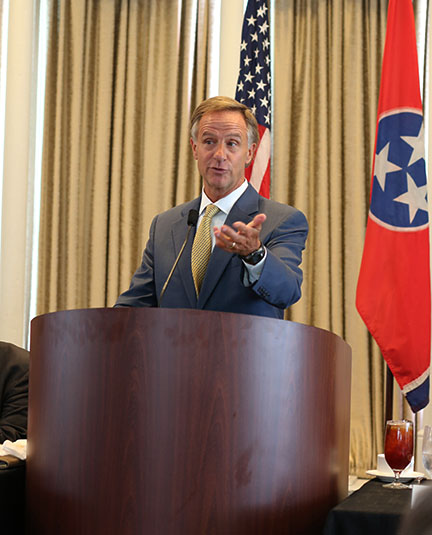In his nearly eight years in office, Governor Bill Haslam has made an indelible mark on Tennessee’s judicial branch. Not only has he appointed nearly one-third of the state’s trial and appellate judges, but he has also offered consistent, strong support for a number of judicial initiatives aimed at solving various problems important to the lives of countless Tennesseans.
At the recent Tennessee Judicial Conference (TJC) held in Memphis, Governor Haslam addressed a gathering of judges to thank them for their dedication, to highlight some of their accomplishments, and to share some of his views on the importance and nature of public service.
“As I look out in this room there are so many people that I love and am very proud to have my name associated with,” Governor Haslam told the crowd, which also included a number of prominent Tennessee legislators. “I take reassurance that long after I’m gone from state government that many of the men and women in here will still be making great decisions that provide for justice for everyone.”
Governor Haslam has appointed 51 trial and appellate judges to the bench. He drew special attention to the number of those who have been women.
“We think we’ve appointed more female judges than anybody” in state history, he said.
Governor Haslam also singled out several court programs that he was especially proud of the judiciary for implementing.
“I just love the initiative that folks in the judiciary have taken to address issues,” he said.
One of the biggest issues affecting Tennessee is the opioid epidemic. Governor Haslam praised state judges for their efforts in developing and presiding over recovery courts that seek to emphasize treatment over incarceration for non-violent offenders. He also thanked the judiciary for the part it played in the creation of the governor’s TN Together plan to combat the state’s opioid epidemic.
“The reality is it took us too long to realize that this was more than just a problem, this was a crisis,” Governor Haslam said. “People in this room knew that before a lot of the rest of us did. They were saying this is a major issue. This branch of government was not just playing a supporting role but you were playing a leading role because you had seen the problem long before we ever did.”
Governor Haslam also extoled Tennessee judges for their work in other areas as well. These include the judiciary’s role in establishing:
- The Business Court Pilot Project, which was set up under the leadership of former Tennessee Supreme Court Chief Justice Sharon Lee in order to simplify and expedite the adjudication of complex business litigation.
- Safe Baby Courts, which focus attention on the mental and physical well-being of children from birth through 3 years of age in Tennessee.
- The ACEs initiative, which trained hundreds of judges and judicial staff about the impacts of adverse childhood experiences on development.
Governor Haslam is also well-known for the attentiveness and care he used when appointing judges to the bench. Chief Justice Jeff Bivins touched on this in his remarks introducing Governor Haslam at the conference.
“I think I’m safe to say he is the only governor in the history of our state who, with every single appointment he had, interviewed all three final candidates individually for a 30-minute time period,” he said. “That’s a phenomenal investment of time.”
Governor Haslam said he does not know exactly what he will do after he leaves office. He does know, however, that he has loved the “incredible opportunity” of serving as Tennessee’s governor.
He encouraged those at the TJC to always focus on the people and the communities that they serve and to realize that it is “a high honor and a privilege” to do so.
“That’s the last thing I would love to communicate is the blessing that all of us in this room have,” he said. “Part of being a human is wanting to have a job that makes a difference. I just think that is wired into all of us. We have all been given positions where we can make an incredible difference, and I think our responsibility in return for that is to do that with a heart of service.”
To view photos from the event, please click here.

